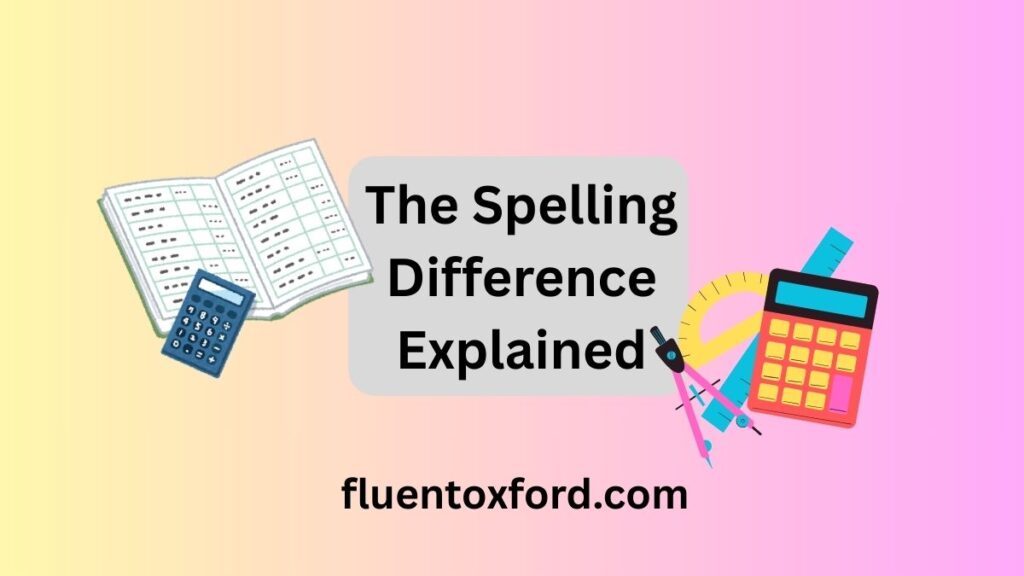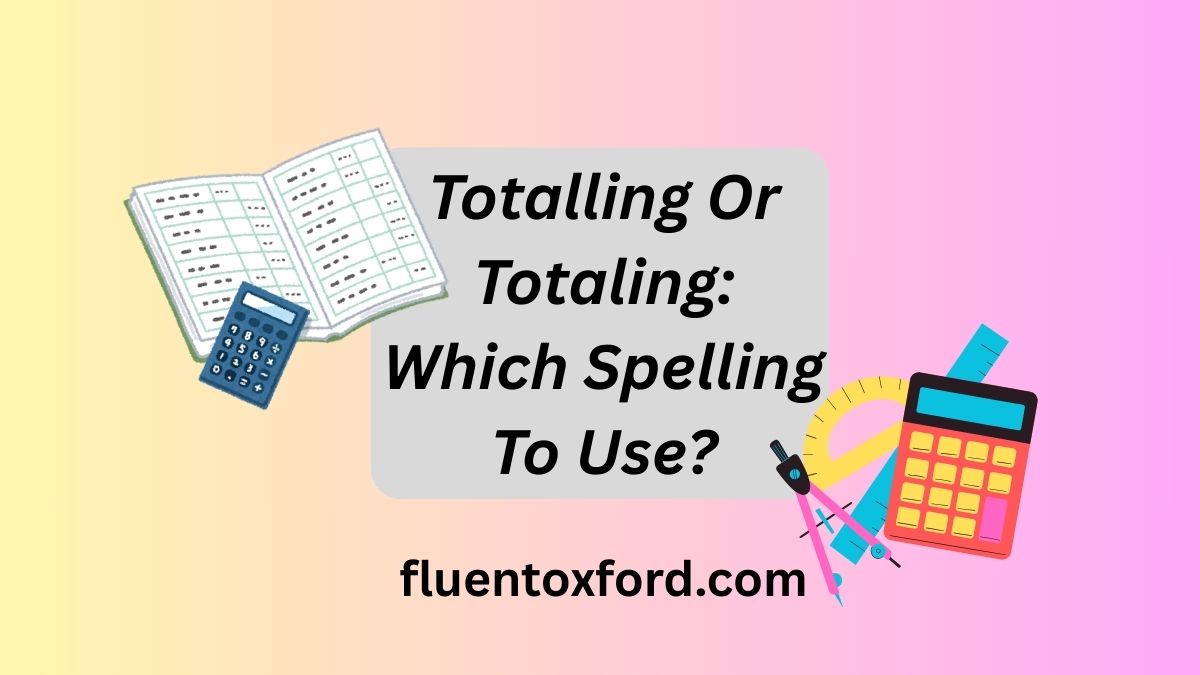Totalling or Totaling: Which Spelling to Use? refers to the variation in spelling of the same word, where “totalling” is commonly used in British English, while “totaling” is the preferred form in American English. Despite representing the same action—adding up numbers or amounts—the distinction lies in regional orthographic conventions. This subtle yet significant difference highlights the broader linguistic divergence between English dialects and emphasizes the importance of understanding audience and context in writing.
In today’s globally connected world, a single word can reveal where you’re from, where you’re publishing, or even who you’re writing for. These tiny variations in spelling can influence readability, perception, and even credibility. Whether you’re drafting an academic paper, creating web content, or polishing a resume, knowing which form to use can make your language feel more polished and precise.
Understanding the choice between “totalling” and “totaling” goes beyond spelling—it taps into the evolving dynamics of language, culture, and communication. From educational materials to professional documents, choosing the right variant ensures clarity and connection with your audience.
What do “Totalling” and “Totaling” Mean?
“Totalling” and “totaling” both refer to the act of adding numbers or amounts together to find the total sum. The difference lies in spelling: “totalling” is the British English form, while “totaling” is used in American English. Despite the spelling difference, they have the same meaning and function in sentences, emphasizing the process of calculating or summing up values.
Both totalling and totaling come from the verb “to total,” which means:
- To add up numbers or amounts
- To reach a sum or final amount
- To completely destroy something, like in the phrase “He totaled his car” (common in American English)
These words are in their present participle form, which shows that the action is happening right now or is ongoing. They’re used just like other “-ing” verbs.
Examples:
- She is totalling her receipts. (UK spelling)
- He is totaling the invoices. (US spelling)
The Spelling Difference Explained

“Totalling” and “totaling” are two spelling variations of the same word, used depending on regional preferences. “Totalling” is the British English form, while “totaling” is used in American English. The difference comes from distinct spelling conventions in the two dialects. Both versions mean the same thing, referring to the act of adding up or summing numbers. Understanding this spelling difference is important for ensuring consistency and clarity when writing for specific audiences or regions.
The difference comes down to regional preference and spelling conventions. It’s not about meaning—both words mean the same thing.
Here’s a quick breakdown:
Totalling – used in British English (UK, Canada, Australia)
Totaling – used in American English (USA)
Table of Usage:
| Spelling | Region | Example |
| Totalling | British English | “She is totalling the bill.” |
| Totaling | American English | “He’s totaling the numbers.” |
This pattern also appears in similar word pairs:
- Travelling (UK) vs. Traveling (US)
- Cancelling (UK) vs. Canceling (US)
- Labelled (UK) vs. Labeled (US)
British English doubles the final “l” when a word ends with a vowel + consonant, before adding “-ing” or “-ed.” American English typically doesn’t.
The Grammar Rule Behind the Spelling Difference
Here’s how it works:
The grammar rule behind the spelling difference stems from the distinction between British English and American English. British English doubles the final consonant (e.g., “totalling”) when adding “-ing” to words ending in a single vowel + consonant. American English typically omits the double consonant, resulting in “totaling.”
British English spelling rules: If a word ends with a single vowel + single consonant and the stress is on the last syllable, double the consonant before adding a suffix like “-ing” or “-ed.”
American English rules: Don’t double the consonant unless the word is stressed on the last syllable and meets the vowel + consonant pattern.
Example: British: Totalling, Travelling, Labelled
American: Totaling, Traveling, Labeled
Why the Confusion Between “Totalling” and “Totaling”?
The confusion between “totalling” and “totaling” arises primarily from regional spelling conventions. British English prefers the double “l” (totalling), while American English drops the extra consonant (totaling). This creates inconsistency in global writing, especially as many digital tools default to American spelling. Additionally, spellcheck software often auto-corrects UK spelling to US conventions, further contributing to the confusion. Writers need to be mindful of their audience and adjust spelling accordingly, especially in formal or international communications.
There are a few reasons this spelling difference causes confusion:
- Spellcheck Tools – Most default to American English, especially online.
- Autocorrect – Often changes UK spelling to American spelling.
- Globalization – Many writers are now writing for an international audience.
- Lack of Awareness – Some don’t know there’s a spelling variation.
In digital writing and SEO, many tools prefer the American form (“totaling”) for standardization and readability. This process is called lexical normalization—it helps software and search engines understand that both versions mean the same thing.
Real-World Examples of Each Spelling

In the media:
- British: “Hospitals totalling billions in debt” – The Guardian
- American: “Totaling the hurricane damage took weeks” – New York Times
In business:
- UK: “The report showed losses totalling £3 million.”
- US: “Operating costs, totaling $2.5 million, increased 10%.”
For Academics:
- UK: “Totalling the migration data was a complex task.”
- US: “Totaling decades of environmental studies proved difficult.”
Using “Totalling” and “Totaling” in Sentences
Examples using totalling (British spelling):
- She’s totalling the figures for the annual report.
- The budget was totalling more than expected.
- Totalling the receipts took all morning.
- The two invoices are totalling a significant sum this month.
- He spent hours totalling all the receipts from the event.
- The data analysis report is totalling the number of visitors to the website.
Examples using totaling (American spelling):
- He’s totaling the sales numbers from last month.
- They are totaling the votes as we speak.
- Totaling all invoices gives us a clear picture of costs.
- He’s totaling the sales figures from last quarter’s earnings.
- The costs for the new campaign are totaling over $5,000.
- She’s totaling the inventory before the store opens for the day.
Synonyms for Totalling or Totaling
Looking for alternatives to avoid repetition or improve clarity? Here are some synonyms:
- Adding up: Summing numbers together.
- Calculating: Determining a total mathematically.
- Summing: Adding to find total.
- Combining: Merging elements or amounts.
- Computing: Using math for totals.
- Aggregating: Collecting and summing data.
- Reckoning: Estimating or calculating totals.
These are great for mixing up your tone and keeping your writing style fresh, especially in long documents or blog posts.
Case Study: A Business Writing Scenario

Imagine you’re writing a financial report for a global audience. Your office is in London, but most of your stakeholders are in New York.
Original sentence: “The total costs, totalling $4 million, include marketing and legal fees.”
Your American readers might flag “totalling” as incorrect or unfamiliar.
Best practice: Use “totaling” to match your audience’s preferred spelling and maintain consistency.
This is where disambiguation and text standardization come into play—choosing the most recognizable form for your readers.
Quick Reference Table: When to Use Totalling or Totaling
| Context | Use Totalling | Use Totaling |
| UK audience | ✅ Yes | ❌ No |
| US audience | ❌ No | ✅ Yes |
| Canadian/Australian | ✅ Usually | ⚠️ Sometimes |
| Academic writing (UK) | ✅ Yes | ❌ Avoid |
| Business writing (US) | ❌ Avoid | ✅ Yes |
| SEO or web content | ⚠️ Depends | ✅ Preferred |
Writing Tips: How to Choose the Right Spelling
Still unsure which version to use? Try these tips:
- Follow a style guide – APA, MLA, and Chicago Manual of Style all prefer American English, which means “totaling.”
- Know your audience – Use “totalling” for a UK-based audience.
- Be consistent – Don’t mix spellings in the same document.
- Change your spellcheck setting – Set your document to match your language variant.
Remember, what matters most is clarity and consistency.
Conclusion
In the end, the answer to Totalling or Totaling: Which Spelling to Use? depends on your audience. If you’re writing for a British or international audience, “totalling” is the better choice. For an American audience, “totaling” is more correct. Both spellings are right in their own regions, so there is no mistake—just a difference in style.
Choosing the correct spelling shows care and attention to detail. Totalling or Totaling: Which Spelling to Use? is a small choice, but it can make your writing clearer and more professional. Always think about who will read your content. That way, your message will sound natural and easy to understand.
FAQs
1. Is “totalling” or “totaling” correct in the UK?
Totalling is the correct spelling in British English and is preferred in the UK, Australia, and often in Canada.
2. Which spelling does the APA Style Guide recommend in 2025?
The APA 7th Edition (2025) recommends using American English, so “totaling” is the correct form.
3. Do major dictionaries list both spellings?
Yes. Both Merriam-Webster and Oxford English Dictionary list totalling and totaling as correct, based on regional usage.
4. Is “totalling” considered a typo in the US?
In American English, “totalling” is often flagged by spell checkers and seen as a spelling error. Use totaling instead.
5. Which spelling should I use for international SEO in 2025?
For broader global reach and alignment with US-based search engines like Google, use totaling for better SEO performance.

As an admin at Fluent Oxford, Maida Queen is the driving force behind our vibrant learning community. With a deep passion for English language education, she ensures that our platform remains a dynamic, engaging, and supportive space for learners worldwide.
Maida expertly manages content, assists users with their grammar and fluency queries, and fosters an interactive environment where learning feels effortless and enjoyable. Whether you need guidance, motivation, or just a friendly face in the Fluent Oxford community, Maida is always there to help you reach your English language goals.








